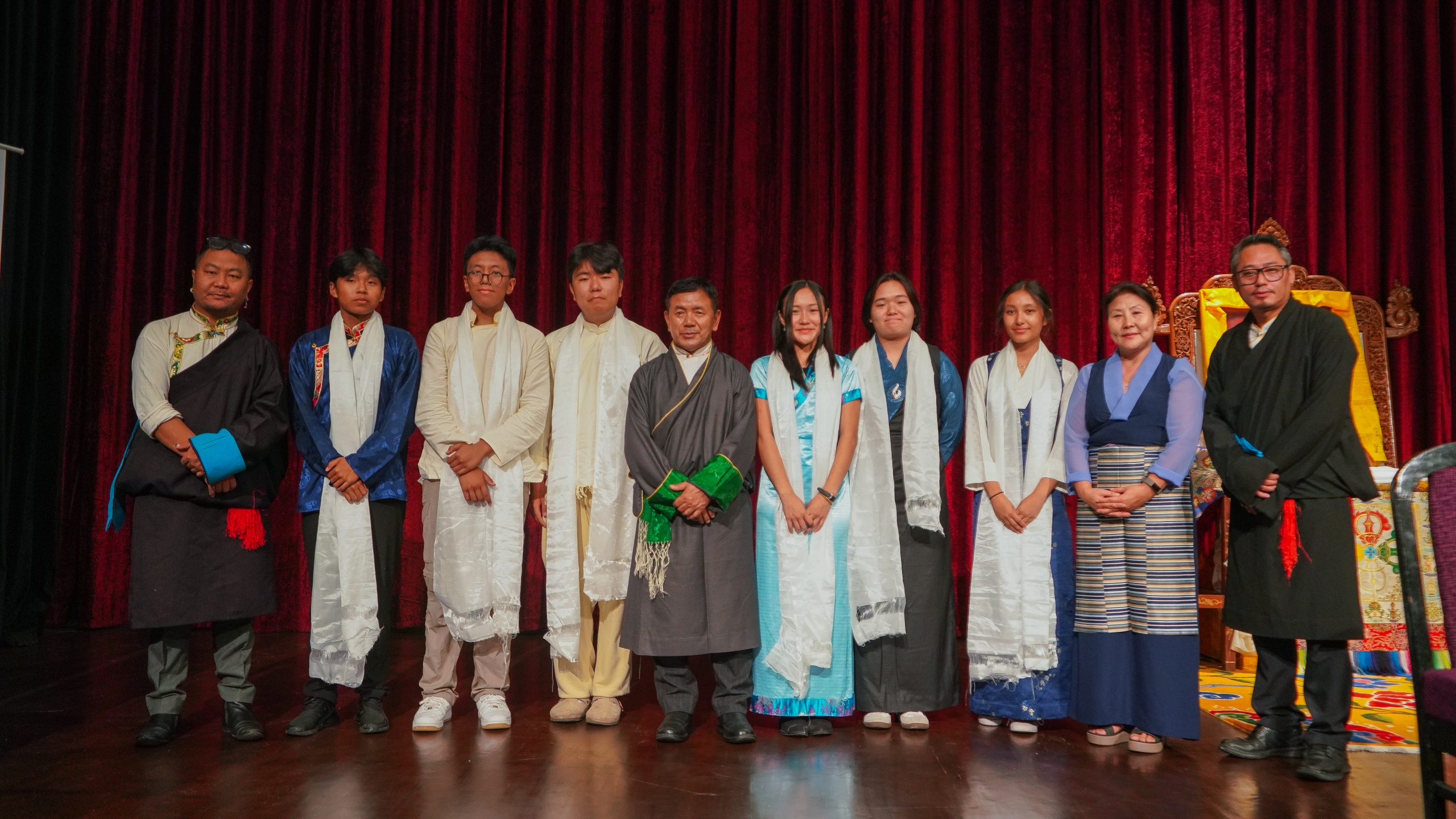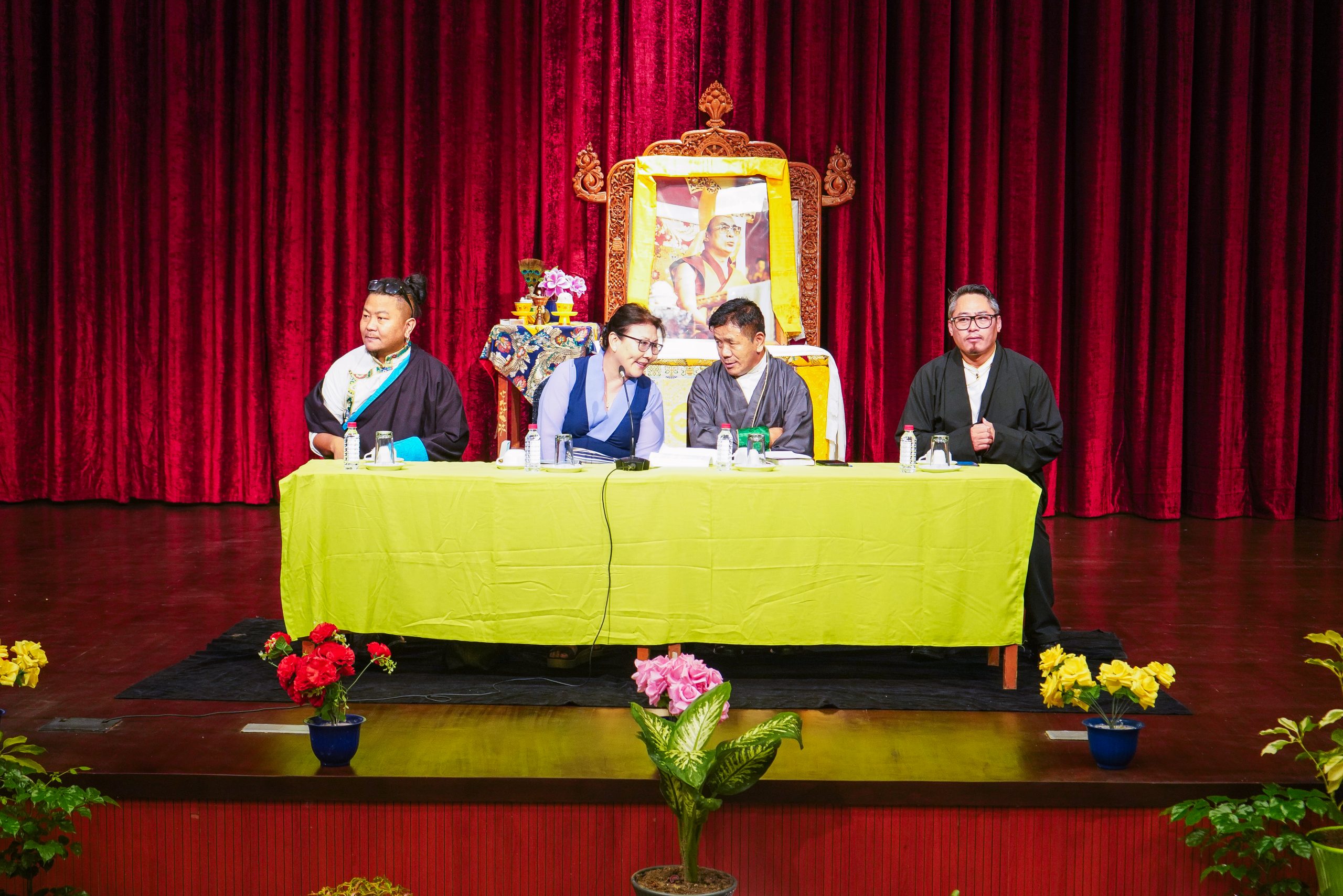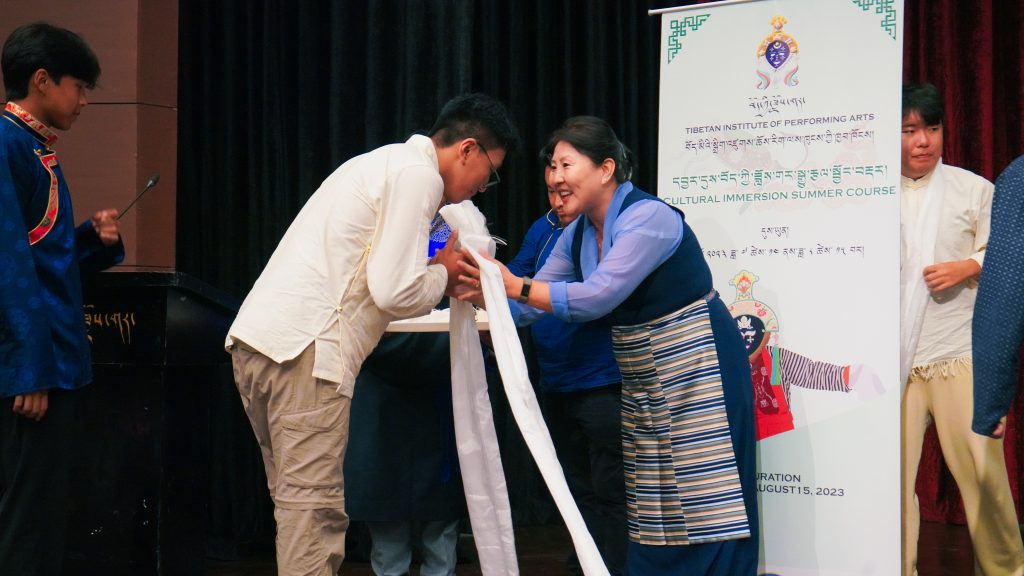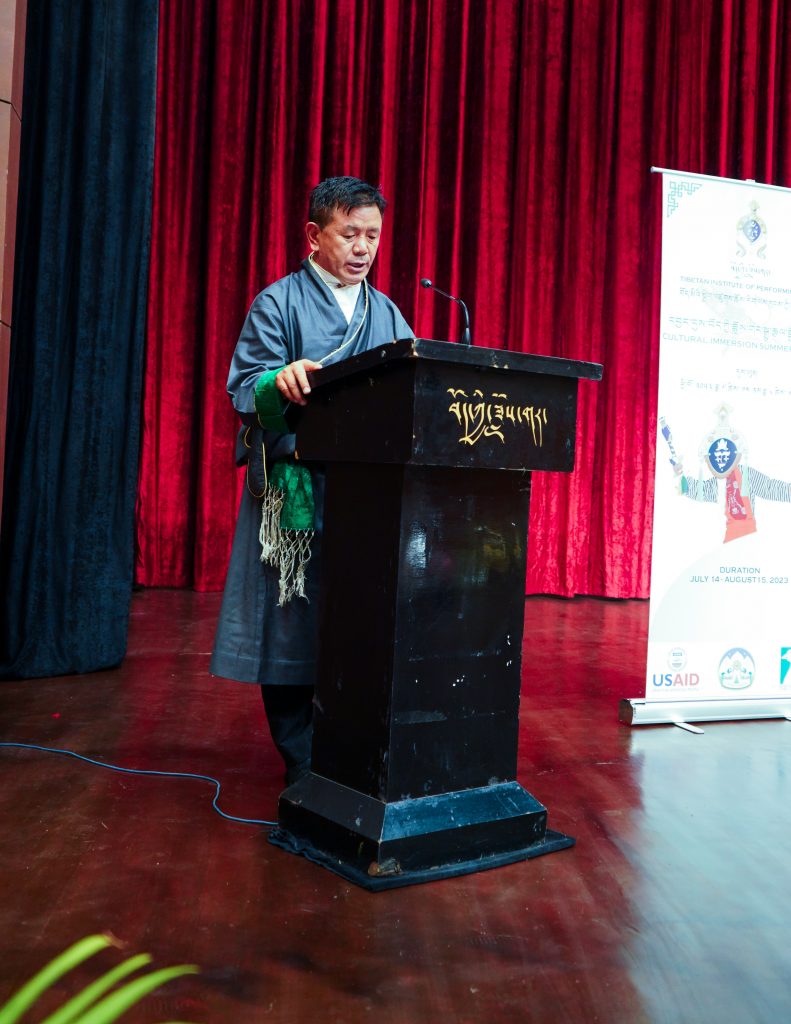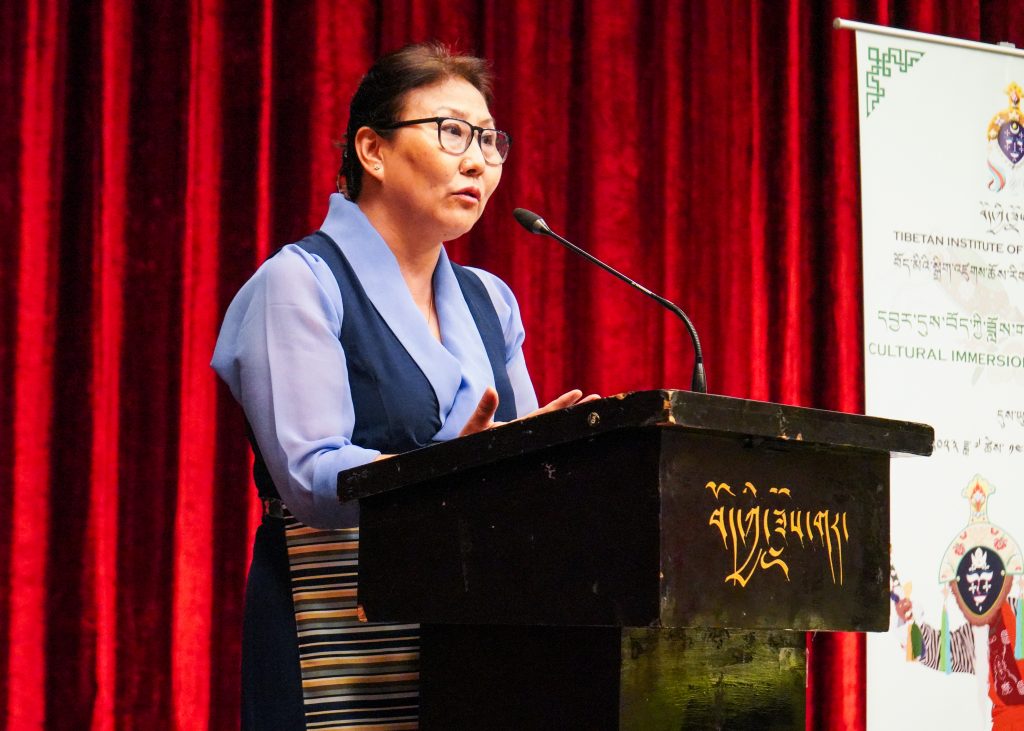ཕྱི་ལོ་ ༢༠༢༣ ཟླ་ ༧ ཚེས་ ༡༤ ཉིན་ཞོགས་པ་ཆུ་ཚོད་ ༡༠།༠༠ ཐོག་བོད་ཀྱི་ཟློས་གར་ཚོགས་པའི་གར་གླུའི་རིག་རྩལ་ཁང་དུ་བོད་ཀྱི་ཟློས་གར་ཚོགས་པའི་གོ་སྒྲིག་འོག་ཕྱི་རྒྱལ་ཡུལ་གྲུ་ཁག་ཏུ་གཏན་སྡོད་བོད་རིགས་ན་གཞོན་སྒྱུ་རྩལ་ཐོག་དོ་དབྱིངས་དང་འདུན་པ་ཡོད་མཁན་ཚོར་དབྱར་དུས་ཀྱི་དགུང་སེང་དང་སྟབས་བསྟུན་ནས་བོད་ཀྱི་ཟློས་གར་སྒྱུ་རྩལ་སྦྱོང་བརྡར་ཟབ་སྦྱོང་ཐེངས་དང་པོ་དབུ་འཛུགས་གནང་སོང་བ་དང་། མཛད་སྒོའི་དབུ་འབྱེད་ཐོག་དཔལ་ལྡན་བོད་མིའི་སྒྲིག་འཛུགས་ཆོས་རིག་ལས་ཁུངས་ཀྱི་སྐུ་ངོ་དྲུང་ཆེ་མཆོག་ཆིབས་སྒྱུར་གནང་སོང་།
སྐུ་མགྲོན་གཙོ་བོ་ཆོས་རིག་དྲུང་ཆེ་མཆོག་གིས། སྤྱིར་བཏང་དབྱར་དུས་བོད་ཀྱི་རིག་གཞུང་ཟབ་སྦྱོང་གནང་མཁན་རྡ་སྟེང་བོད་ཁྱིམ་དང་ས་རཱ་མཐོ་སློབ་སོགས་མང་པོ་ཡོད་ཀྱང་། དེ་རིང་བོད་ཀྱི་ཟློས་གར་ཚོགས་པའི་གོ་སྒྲིག་ཞུས་པའི་ཟབ་སྦྱོང་འདི་ནི་ཧ་ཅང་གི་དམིགས་བསལ་དང་གལ་ཆེན་པོ་ཆགས་ཀྱི་ཡོད། དེའི་ནང་བོད་ཀྱི་ཟློས་གར་རིག་གཞུང་ཐོག་དམིགས་བསལ་གྱི་སློབ་ཁྲིད་གནང་གི་ཡོད་པར་སོང་ཚང་མས་དོ་སྣང་ཆེན་པོས་སློབ་སྦྱོང་གནང་རྒྱུ་གལ་ཆེན་པོོ་རེད། ཕ་མ་ཚོས་ཀྱང་བོད་ཀྱི་ཟློས་གར་རིག་གཞུང་གལ་ཆེར་འཛིན་ཏེ་རང་གི་ཕྲུ་གུ་ཟབ་སྦྱོང་དེའི་ཆ་ཤས་སུ་མཉམ་ཞུགས་གནང་བར་བཀའ་དྲིན་ཆེ་ཞུ་རྒྱུ་ཡིན། རྣམ་པ་ཚོའི་ངོས་ནས་རང་མི་རིགས་ཀྱི་ལོ་རྒྱུས་དང་ཕ་མེས་ཚོས་དཀའ་སྡུག་ཅི་ཞིག་མྱོང་བ་རྣམས་རང་གི་ཕྲུ་གུར་ངོ་སྤྲོད་བྱ་རྒྱུ་ཧ་ཅང་གི་གལ་ཆེན་པོ་རེད། གཞོར་དུ་ཟབ་སྦྱོང་ནང་བོད་ཀྱི་ལོ་རྒྱུས་ངོ་སྤྲོད་དང་བོད་ཀྱི་རྒྱལ་གླུ་སློབ་ཁྲིད་གནང་རྒྱུ་ཧ་ཅང་གི་གལ་ཆེན་པོ་ཡིན། གང་ཡིན་ཟེར་ན་ཕྱི་རྒྱལ་ཡུལ་གྲུ་ཁག་ཏུ་བོད་མི་འདུ་འཛོམས་གང་སར་བོད་རྒྱལ་ཁབ་ཆེན་པའི་རྒྱལ་གླུ་གཏོང་དགོས་ཀྱི་ཡོད་པར་བརྟེན་ཧ་ཅང་གི་ཕན་ཐོགས་ཡོད་ཅེས་བཀའ་སློབ་གནང་སོང་།
དེ་ནས་ཟློས་གར་འགན་འཛིན་སྐུ་ངོ་དོན་གྲུབ་ཚེ་ལགས་ཀྱིས་ཟབ་སྦྱོང་གི་དགོས་དམིགས་ངོ་སྤྲོད་གནང་དོན། ཉེ་སྔོན་ཞིག་ནས་ཕྱི་རྒྱལ་ཡུལ་གྲུ་ཁག་ནས་ཕ་མ་ཚོས་རང་གི་ཕྲུ་གུ་རྒྱ་གར་དུ་གུང་གསེང་ལ་འཁྲིད་གཞོར་བོད་ཀྱི་ཟློས་གར་ཚོགས་པར་བཅར་ཏེ་རོལ་ཆ་དང་ལྷ་མོ་སོགས་སློབ་ཁྲིད་གནང་རྒྱུའི་རེ་འདུན་ཞུ་མཁན་བྱུང་མུས་ཡིན་པར་སོང་ཕྱི་ལོ་ ༢༠༢༣ ཟླ་ ༣ པའི་ནང་ཕྱི་རྒྱལ་སྐུ་ཚབ་དོན་གཅོད་ཁག་དང་བོད་རིགས་སྤྱི་མཐུན་ཚོགས་པ། བོད་ཀྱི་ཟློས་གར་ངོ་དོབ་དང་བོད་མིའི་སྒྲིག་འཛུགས་ཀྱི་དྲ་རྒྱ་བརྒྱུད་གསལ་བསྒྲགས་སྤེལ་ཏེ་བོད་ཀྱི་ཟློས་གར་སྒྱུ་རྩལ་ཟབ་སྦྱོང་གི་སློབ་བསྡུ་གསལ་བརྡ་བཏང་བ་བཞིན། དེ་རིང་འདིར་དངོས་སུ་སློབ་ཕྲུག་བཅུ་མཉམ་ཞུགས་བྱུང་བར་འཚམས་འདྲི་གནང་བ་དང་། ཕ་མེས་ནས་བརྒྱུད་པའི་བོད་ཀྱི་རིག་གཞུང་བཟང་པོ་རྣམས་མི་རབས་རྗེས་མའི་རྒྱུན་འཛིན་བྱེད་དགོས་པར་སོང་ད་ལན་ཕྱི་རྒྱལ་ཡུལ་གྲུ་ཁག་ཏུ་འཚར་ལོངས་བྱུང་བཞིན་པའི་ན་གཞོན་ཚོར་དམིགས་ཏེ་བོད་ཀྱི་ཟློས་གར་རིག་གནས་དང་སྒྱུ་རྩལ་ཐོག་ཟབ་སྦྱོང་སྤྲོད་རྒྱུའི་དམིགས་ཡུལ་འཛིན་ཡོད། ད་ལན་གྱི་ཟབ་སྦྱོང་འདི་ནི་བོད་ཀྱི་ཟློས་གར་ཚོགས་པའི་ཕྱི་རྒྱལ་ཡུལ་གྲུ་ཁག་གི་གཞོན་སྐྱེས་ཚོར་སྤེལ་བའི་ལས་འཆར་ཐེངས་དང་པོ་ཆགས་ཀྱི་ཡོད་པར་བརྟེན་ཟབ་སྦྱོང་གི་དུས་རིམ་འདི་ནས་བློ་བསྐྱེད་གང་མང་རག་རྒྱུའི་རེ་བ་ཞུ་བཞིན་ཡོད་ཅེས་གསུངས་སོང་།
སྤྱིར་དེ་རིང་གི་ཟབ་སྦྱོང་འདི་ནི་ཕྱི་ཟླ་ ༧ ཚེས་ ༡༤ ནས་ཕྱི་ཟླ་ ༨ ཚེས་ ༡༥ བར་ཚོགས་གཏན་འཁེལ་འདུག་ལ། ཟབ་སྦྱོང་ནང་བོད་ཀྱི་ཟློས་གར་རིག་གནས་ངོ་སྤྲོད་དང་བོད་ཀྱི་རོལ་ཆ་སྒྲ་སྙ་དང་པི་ཝང་། ཡང་ཆེན། གླིང་བུ། ལྷ་མོའི་རྣམ་ཐར། ཞབས་བྲོ་དང་སྒོར་གཞས། བོད་ཀྱི་སྐད་ཡིག་སོགས་སྣ་འཛོམས་སློབ་ཁྲིད་གནང་རྒྱུ་རེད་འདུག ཟབ་སྦྱོང་ནང་ཨ་རི་དང་ཡོ་རོབ་སོགས་ནས་སློབ་ཕྲུག་བཅུ་ཙམ་མཉམ་ཞུགས་གནང་འདུག མཐར་བོད་ཀྱི་ཟློས་གར་ཚོགས་པའི་དྲུང་ཆེ་བསོད་ནམས་ཆོས་འཕེལ་གྱིས་ཐུགས་རྗེ་ཆེ་གསུངས་གནང་སྟེ་མཛད་སྒོ་གྲུབ་སོང།
One-month cultural immersion summer course begins today
The first-ever cultural immersion summer course’s inauguration ceremony was conducted in the new auditorium on July 14 with Ms. Chime Tseyang, the DoRC secretary, serving as the chief guest.
The principal guest spoke about comparable curricula for advanced Tibetan studies being provided by Sarah College and TCV School. However, she stressed the program’s singularity as being notably different, though, and advised the participants to learn as much as they can to stand out in their respective communities. She commended the parents for enrolling their children for the course and recognising its significance.
She discussed the importance of parents teaching their kids about the past and the struggles that earlier generations have faced.
She suggested that in addition to teaching the pupils performance skills, teachers teach them the Tibetan national hymn, which is sung at all official Tibetan events and on other occasions.
TIPA’s director, Dhondup Tsering, presented a welcome speech and went into great detail about how the actual course came to be. The programme originally began as a series of requests from parents who wished to have their children acquire and practise performing arts talents at TIPA in the midst of already hectic schedules.
In order to spread the course notice, the representative offices were approached with this notion. Additionally, the announcement was made via TIPA’s social media accounts.
The seven participants from the US and Germany will learn about Tibetan opera, folk music, and the impact of music on societies through this curriculum.
At the conclusion, the USAID, CTA, and the Tibet Fund were thanked for making it possible by TIPA Secretary Sonam Chophel.
